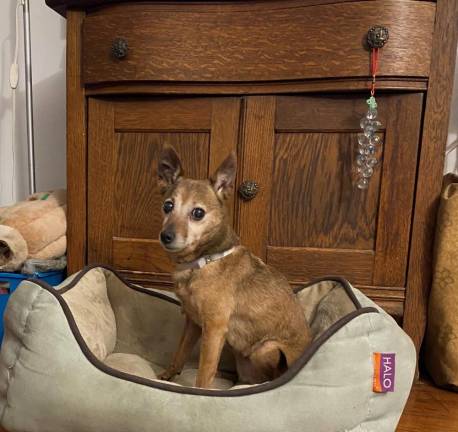Second Thoughts About Pandemic Pets
City animal rescues push for long-lasting matches during COVID-19




At Woof Dog Rescue, the recent craze for canine company during the pandemic quickly grew evident in the dwindling number of animals that the nonprofit needed to relocate from local shelters.
Normally, the Upper East Side rescue would relocate 40 to 60 dogs (and 10 to 12 cats) from shelters to foster homes while the pets awaited adoption each year. Once COVID-19 hit New York last spring, the nonprofit didn’t need to rescue nearly as many — “there was such a demand,” Woof Dog Rescue Founder Barbara Fox explained over the phone, that she estimated her organization fostered only five dogs at the time, since local shelters had practically “emptied out.”
But now, even as the coronavirus crisis continues, Fox worries that some new pet caretakers might be having second thoughts.
“Unfortunately now, or at least starting recently,” she said, “a lot of people are, number one, you know, going back to work and not home anymore, and realizing that they don’t really need the company.”
Woof Dog Rescue is not alone in experiencing a varied impact from COVID-19 on animal surrendering, fostering, and adopting. Anjellicle Cats Rescue and Social Tees Animal Rescue, two New York City foster-based organizations, have felt a heightened sense of responsibility to place animals in fitting homes, even amidst increased interest in fostering and adopting. But in many cases, it seems that harder-to-care-for pets are still in need.
Financial Issues
At Woof Dog Rescue, animals requiring expensive medical care have caught Fox’s attention. She described one recently adopted dog, Emmy Lou, whose nearly two-week-long treatment of pneumonia at The Animal Medical Center cost close to $12,000.
“People are having financial issues now,” Fox said. “So a lot of the dogs are going into the shelters because ... they can’t even afford to feed their own family, much less their dogs. Or they can’t afford necessary medical attention that the dogs may need.”
Woof Dog Rescue pulls animals from the Animal Care Centers of NYC (ACC), where Director of Marketing and Communications Katy Hansen wrote in an email that three fourths of shelter animals were relocated to foster homes at the end of March. The overall number of animals taken in by ACC dropped nearly 40 percent from last year (14,146 total in 2020 compared to 23,172 in 2019), according to board meeting slides from the end of January.
Hansen explained that this trend is continuing into the new year and that COVID-19 illness or related financial struggles have “surprisingly” not been a driving force behind animal surrenders to the shelter. But she also noted the beginning of a swell in “harder to place dogs - ones with behavior issues.”
At Anjellicle Cats Rescue — which sources cats from ACC in addition to other nearby shelters — Co-Director Nora Wood has begun to witness a more acute impact of COVID-19 on families and their animals, namely when pet owners fall critically ill.
“Nurse practitioners or social workers are getting more involved,” Wood explained in a phone call.
“When it’s a member of the public, it’s their cat and they are surrendering the animal,” she later added, “it’s much easier to get information about the animal ... When it’s someone, who, like the nurse who’s saying, ‘Someone on my ward died,’ with that one we’re kind of going in blind.”
Fewer Choices
Mostly, though, Wood fears that more widespread COVID-19 stressors — like housing uncertainty or financial instability — have left desperate pet owners with fewer choices when they’re no longer able to keep up with their finicky feline companions.
“I suspect what’s happening is that now, as people are dealing with so many other issues in their lives and their options are limited,” Wood said, “that with an older pet that they maybe could have found a place for, that those options are now even shrinking.”
East Village nonprofit Social Tees Animal Rescue, which usually rescues around 300 to 400 dogs a year (predominantly from shelters in Tennessee), has begun vetting prospective foster homes more rigorously to avoid less-than-ideal outcomes further down the road.
Julie Ainsbury, Social Tees Animal Rescue’s director of programs, explained over the phone that the organization was “bombarded with requests to adopt animals and foster animals” at the outset of the pandemic in March — she received 1,500 emails from people interested in fostering over the span of two weeks, to be precise. Since then, demand to foster has remained steady.
But now more than ever, the Social Tees Animal Rescue team asks those interested in fostering or adopting pets specific questions about their job stability (Ainsbury estimates that typical vet visits can cost anywhere from $100 to $300), lifestyle before and after the pandemic, and more to concoct sustainable human-animal pairings.
“It really is a lifelong commitment,” Ainsbury explained of adopting a pet, “not just a quarantine pandemic activity. It’s not baking bread, you know. It’s a life.”
“A lot of the dogs are going into the shelters because ... [people] can’t even afford to feed their own family, much less their dogs. Or they can’t afford necessary medical attention that the dogs may need.” Woof Dog Rescue Founder Barbara Fox